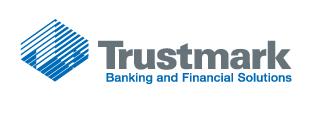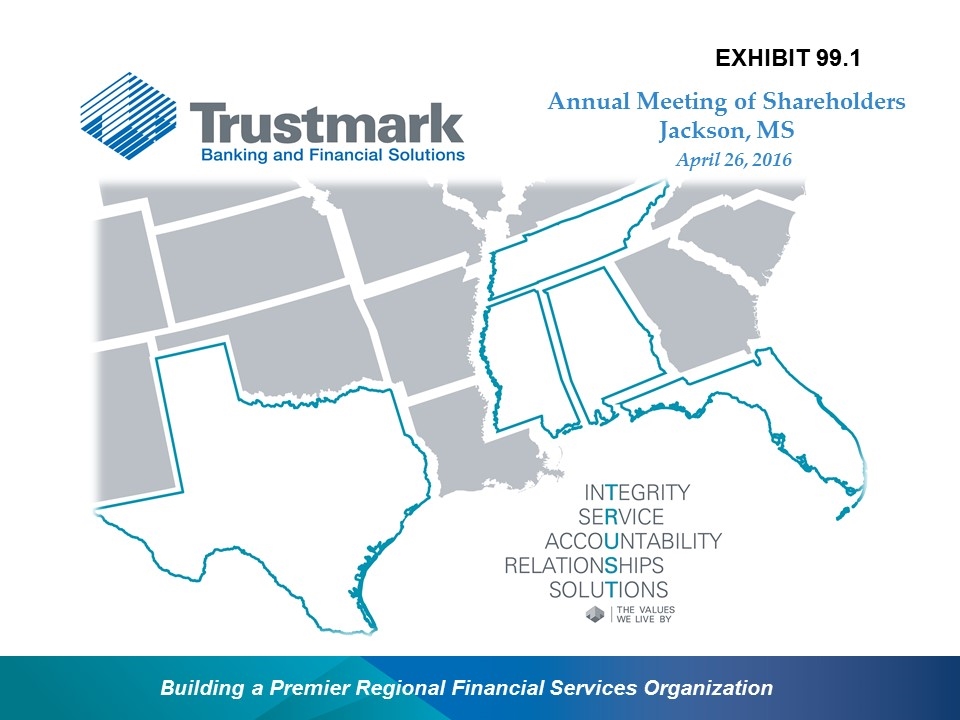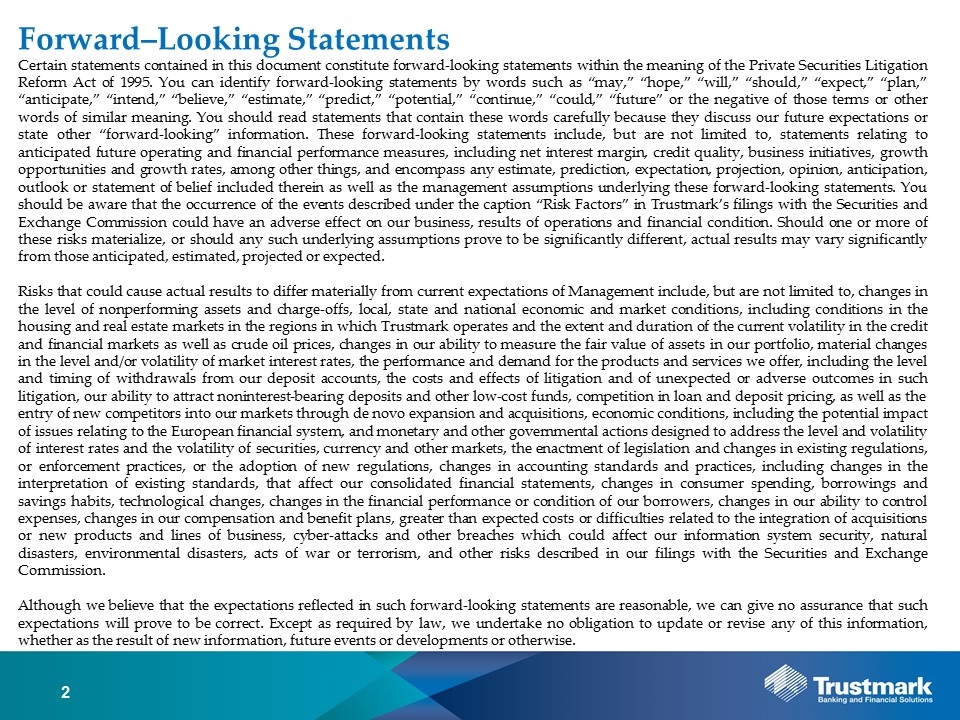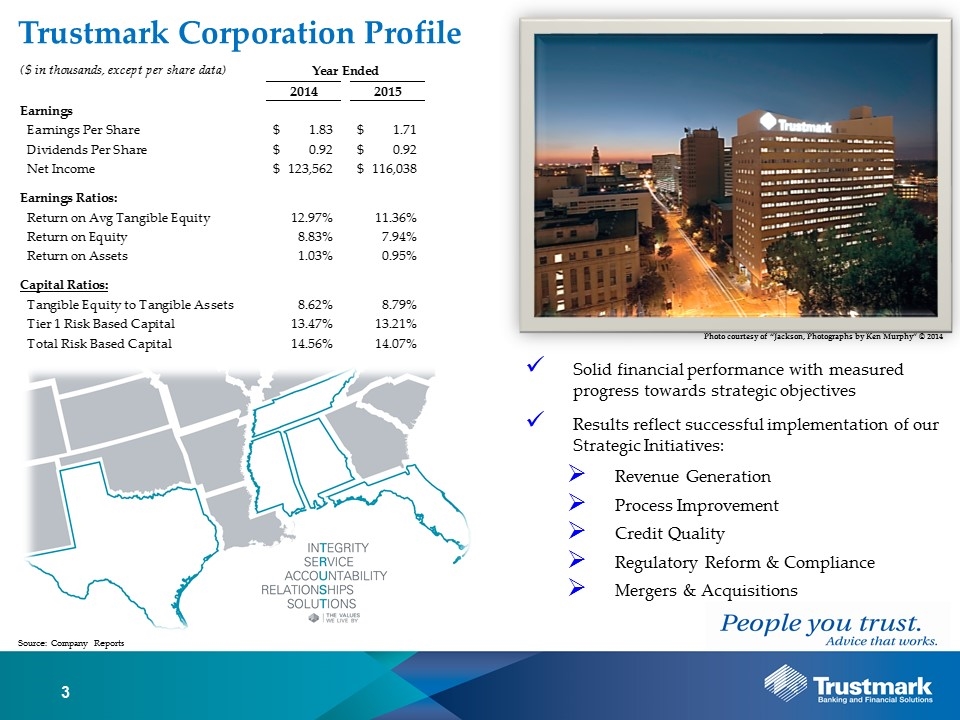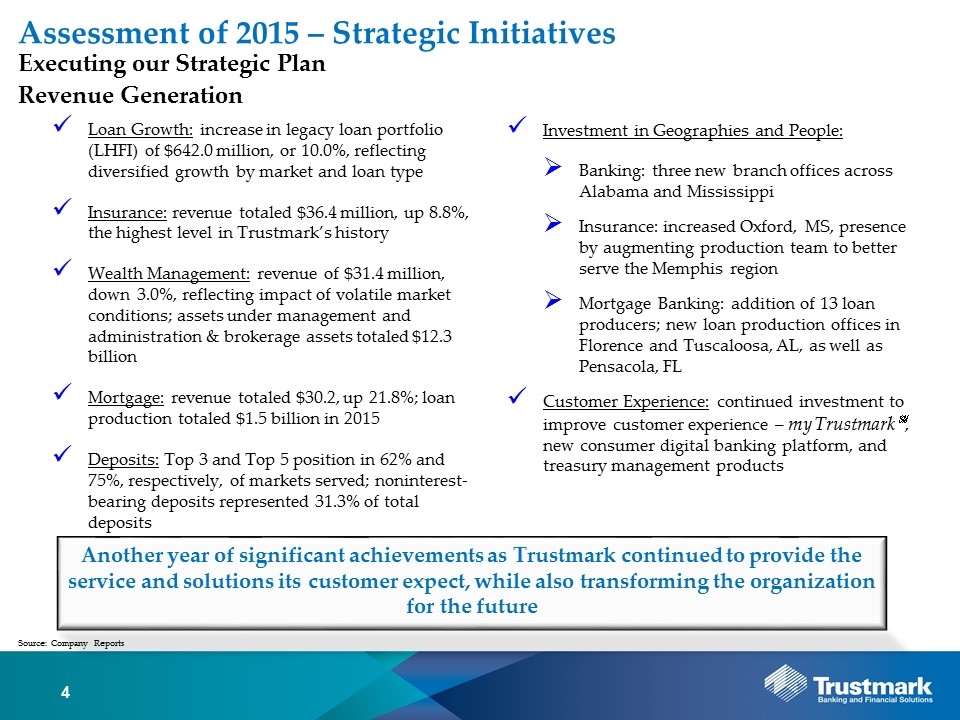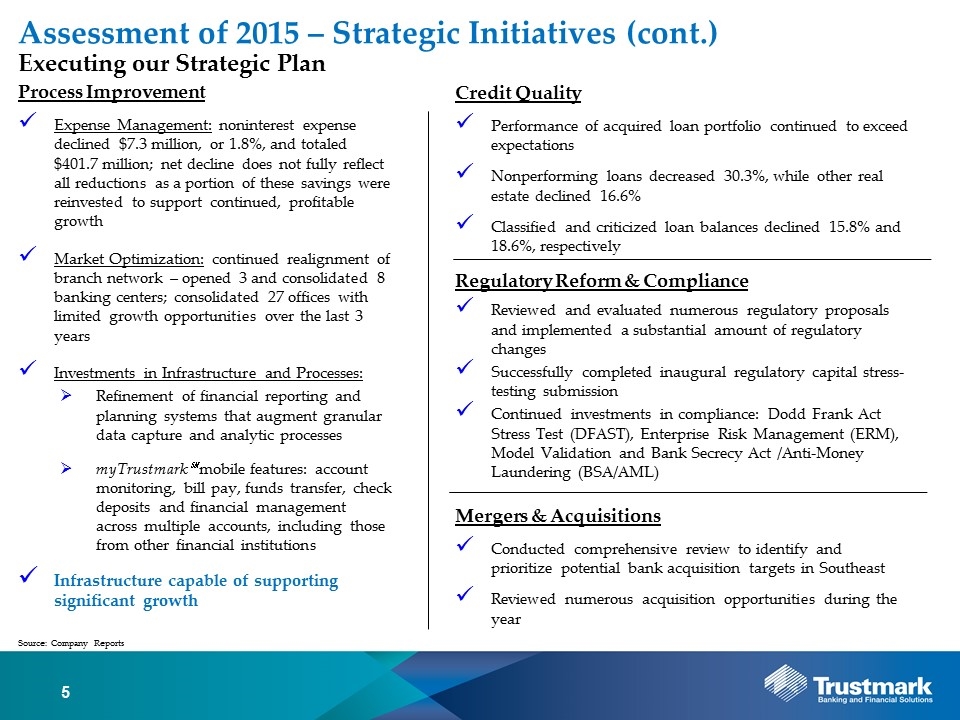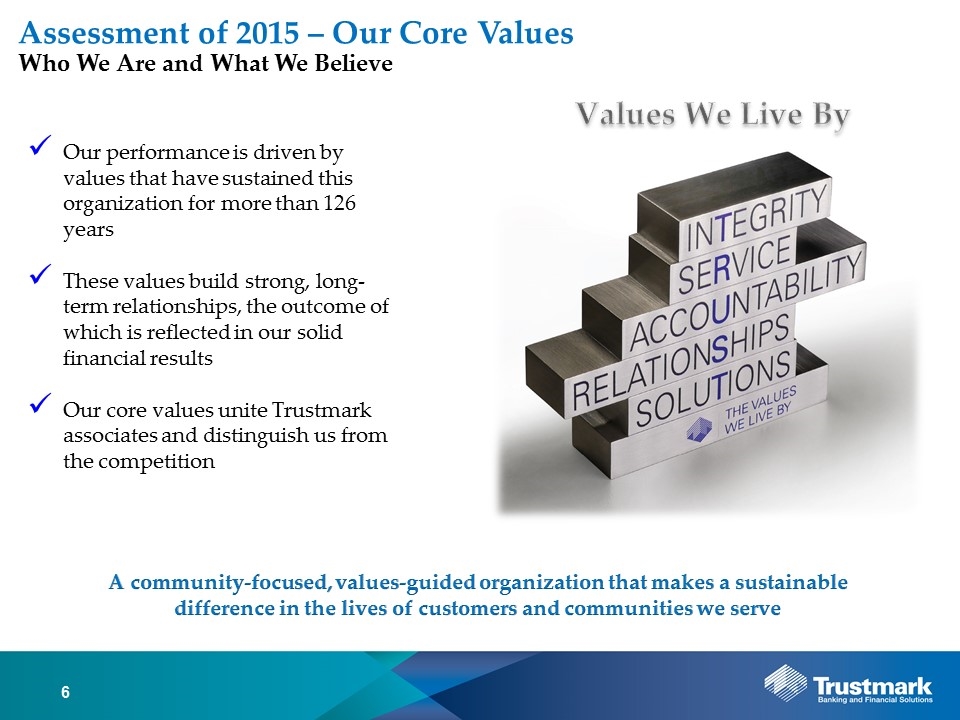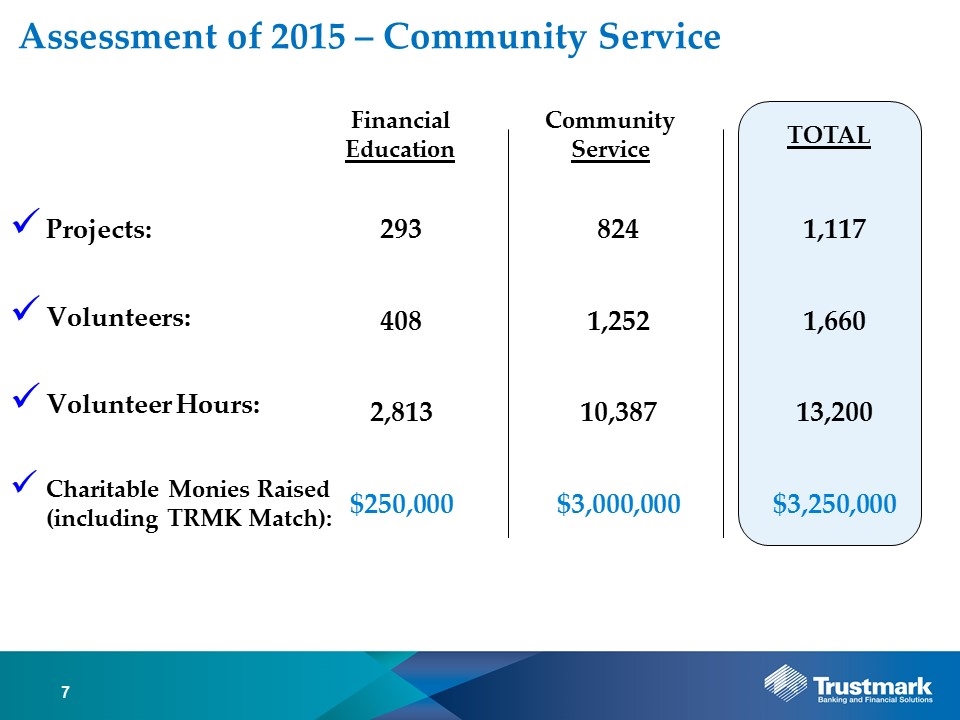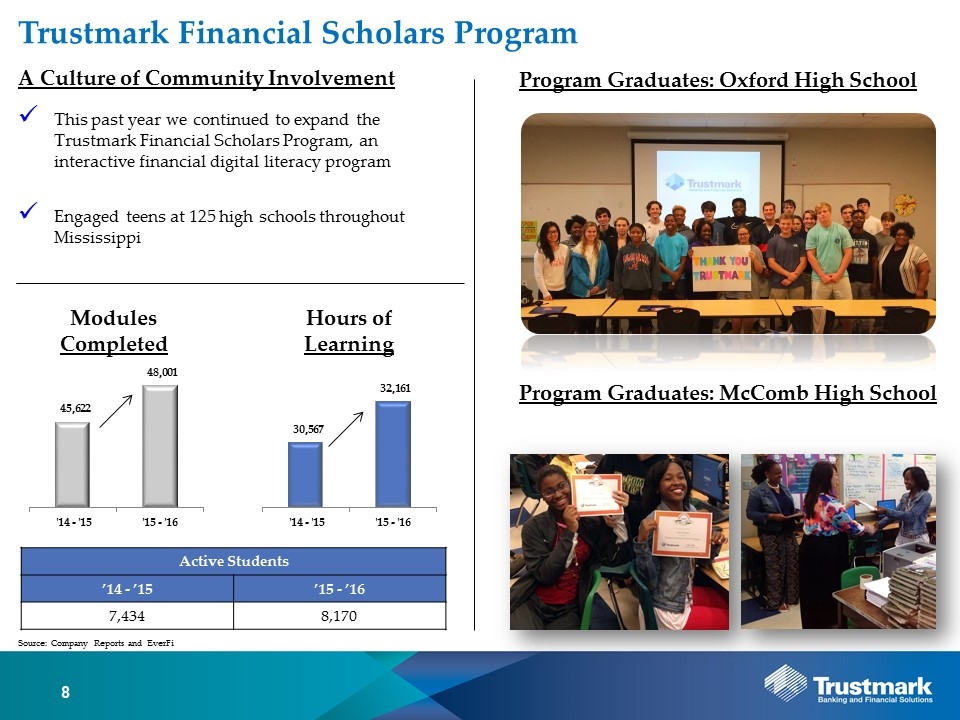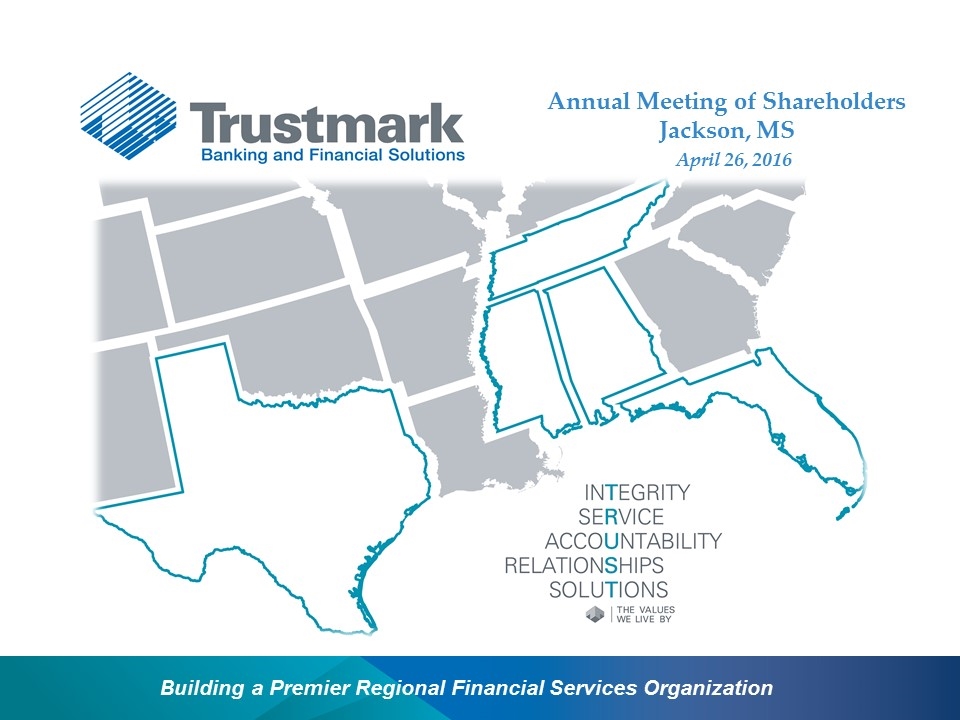trmk-ex32_7.htm
EXHIBIT 3.2
BYLAWS
OF
TRUSTMARK CORPORATION
AS AMENDED AND RESTATED AS OF
APRIL 28, 2016
BYLAWS
OF
TRUSTMARK CORPORATION
(Incorporated under the laws of Mississippi)
ARTICLE I
OFFICES
The principal office shall be in the City of Jackson, County of Hinds, State of Mississippi; and the name of the resident agent for process upon the corporation is Granville Tate, Jr., whose mailing address is 248 East Capitol Street, Jackson, Mississippi. The corporation may also have offices at such other places as the Board of Directors may from time to time appoint, or as the business of the corporation may require.
ARTICLE II
STOCKHOLDERS’ MEETINGS
1. Place. The place of all meetings of stockholders shall be the principal office of the corporation in the City of Jackson, County of Hinds, State of Mississippi, or such other place as shall be determined, from time to time, by the Board of Directors. The place at which such meeting shall be held shall be stated in the notice of the meeting.
2. Time. The annual meeting of stockholders for the election of directors and for the transaction of such other business as may properly come before the meeting shall be held each year on the date and at the time selected by the Board of Directors and stated in the notice of the meeting.
3. Special Meetings. Special meetings of stockholders, for any purpose or purposes, unless otherwise prescribed by statute, may be called by the President or by a majority of the Board of Directors and shall be called at any time by the President or the Board of Directors upon the request of stockholders owning ten percent (10%) of the outstanding shares of the corporation entitled to vote at such meetings. Business transacted at all special meetings shall be confined to the objects stated in the notice of the meeting.
4. Notice.
(a) Written notice stating the date, time and place of the meeting (and in the case of a special meeting, the purpose or purposes for which the meeting is called) shall be given at least ten (10) days and not more than sixty (60) days prior to the meeting, at the direction of the President, the Secretary or other officer or persons calling the meeting. Such notice shall be
given to each stockholder of record entitled to vote at the meeting; and notice shall be deemed delivered to the stockholder when deposited in the United States mail, postage prepaid, addressed to the stockholder at his last known post office address or to the address appearing on the stock transfer books of the corporation.
(b) Without limiting the manner by which notice otherwise may be given effectively to stockholders, any notice to stockholders given by the corporation under any provision of the Mississippi Business Corporation Act (the “MBCA”), the Articles of Incorporation or these Bylaws, shall be effective if given by a form of electronic transmission consented to by the stockholder to whom the notice is given. Any such consent shall be revocable by the stockholder by written notice to the corporation. Any such consent shall be deemed revoked if (i) the corporation is unable to deliver by electronic transmission two consecutive notices given by the corporation in accordance with such consent, and (ii) such inability becomes known to the Secretary or an Assistant Secretary of the corporation or to the transfer agent or other person responsible for the giving of notice; provided, however, the inadvertent failure to treat such inability as a revocation shall not invalidate any meeting or other action. Notice given pursuant to this Section 4(b) shall be deemed given: (1) if by facsimile telecommunication, when directed to a number at which the stockholder has consented to receive notice; (2) if by electronic mail, when directed to an electronic mail address at which the stockholder has consented to receive notice; (3) if by a posting on an electronic network together with separate notice to the stockholder of such specific posting when such notice is directed to the record address of the stockholder or to such other address at which the stockholder has consented to receive notice, upon the later of such posting or the giving of such separate notice; and (4) if by any other form of electronic transmission, when consented to by the stockholder. In addition, notice can be given in any manner authorized by the MBCA.
5. Voting List. A complete list of stockholders entitled to notice of the ensuing meeting, arranged in alphabetical order, with the address of and number of shares held by each, shall be prepared by the Secretary or by the corporation’s designated transfer agent or other agent, who shall have charge of the stock transfer books of the corporation. The stockholders’ list shall be available for inspection by any stockholder no later than two (2) business days after notice of the meeting is given for which the list was prepared and continuing through the meeting, at the corporation’s principal office or at a place identified in the meeting notice in the city where the meeting will be held.
6. Quorum. A majority of the outstanding shares of the corporation entitled to vote, represented in person or by proxy, shall constitute a quorum at any meeting of stockholders, unless otherwise provided by law; but less than a quorum may adjourn any meeting, from time to time, and the meeting may be held, as adjourned, without further notice if the new date, time or place is announced at the meeting before adjournment.
7. Voting of Shares. If a quorum is present, action on a matter (other than the election of directors) is approved if the votes cast favoring the action exceed the votes cast opposing the action, unless the vote of a greater number is required by the Articles of Incorporation or by law for any specific purpose. Voting at all meetings may be oral, but any qualified voter may demand a stock vote whereupon the vote will be taken by ballot, each of which shall state the name of the
2
stockholder voting and the number of shares voted by him; and if such ballot be cast by a proxy, it shall also state the name of such proxy. Each stockholder shall have one vote for each share of stock having voting power, registered in his name as of the record date for the meeting or the closing date of the stock transfer books, as applicable, upon each matter submitted to a vote at any meeting of stockholders.
8. Proxies. Every stockholder having the right to vote shall be entitled to vote either in person or by proxy executed electronically or in writing. No proxy shall be valid after eleven (11) months from the date of its execution, unless otherwise provided in the proxy. Proxies shall be dated and shall be filed with the records of the meeting.
9. Election of Directors; Majority Voting. Unless otherwise provided in the Articles of Incorporation, and except as provided in Article III, Section 4, a nominee for director shall be elected to the Board of Directors at any meeting of stockholders at which a quorum is present if the votes cast for such nominee’s election exceed the votes cast against such nominee’s election; provided, however, that nominees for director shall be elected by a plurality of the votes cast at any meeting of stockholders for which the number of nominees exceeds the number of directors to be elected. If a nominee who is an incumbent director is not elected to the Board of Directors and no successor has been elected at such meeting of stockholders, such nominee shall tender his resignation to the Board of Directors. The Nominating Committee shall make a recommendation to the Board of Directors on whether to accept or reject the resignation, or whether to take other action. The director who tenders his resignation shall not participate in the recommendation of the Nominating Committee or the decision of the Board of Directors with respect to such director’s resignation.
10. Nominations for Director. Nominations for election to the Board of Directors may be made by or on behalf of the Board of Directors or by any stockholder of any outstanding class of capital stock of the corporation entitled to vote for election of directors at an annual meeting. Nominations other than those made by or on behalf of the existing Board of Directors of the corporation shall be made in writing and shall be delivered or mailed to the Chairman of the Board of the corporation and received (a) not less than sixty (60) days nor more than ninety (90) days before the first anniversary of the mailing date of the corporation’s proxy statement in connection with the last annual meeting of stockholders, or (b) if no annual meeting was held in the previous year or the date of the applicable annual meeting has been changed by more than thirty (30) days from the date of the previous year’s annual meeting, not less than ninety (90) days before the date of the applicable annual meeting. Such notification shall contain the following information to the extent known to the notifying stockholder: (a) the name and address of each proposed nominee; (b) the principal occupation of each proposed nominee; (c) the total number of shares of capital stock of the corporation that will be voted for each proposed nominee; (d) the name and residence address of the notifying stockholder; (e) the number of shares of capital stock of the corporation owned by the notifying stockholder; (f) such other information regarding such proposed nominee as would be required to be included in a proxy statement filed pursuant to the proxy rules of the Securities and Exchange Commission had the proposed nominee been nominated by the Board of Directors; (g) a representation that the notifying stockholder is the owner of shares entitled to vote at the meeting and intends to appear in person or by proxy at the meeting to nominate the proposed nominee; and (h) the written
3
consent of each proposed nominee to serve as a director of the corporation if so elected. Nominations not made in accordance herewith may, in his discretion, be disregarded by the chairman of the meeting, and upon his instructions the vote tellers may disregard all votes cast for each such nominee.
11. Judges of the Election. Every election of directors shall be managed by three judges, who shall be appointed by the chairman and who shall hold, either directly or indirectly (including, without limitation, indirect ownership as a participant in any pension plan, profit sharing plan or other employee benefit plan) shares of the corporation. The judges of election shall hold and conduct the election at which they are appointed to serve; and, after the election, they shall file with the Secretary a Certificate under their hands certifying the results thereof and the names of the directors elected. The judges of election, at the request of the chairman for the meeting, shall act as tellers of any other vote by ballot taken at such meeting, and shall certify the results thereof.
ARTICLE III
BOARD OF DIRECTORS
1. General Powers. Except as provided in the Articles of Incorporation, the management of the affairs, property, and business of the corporation shall be vested in the Board of Directors.
2. Number, Tenure, and Qualifications. Unless otherwise provided in the Articles of Incorporation and subject to the limitations of law, the number of directors of the corporation shall not be less than five (5) nor more than twenty-five (25) directors, the exact number within such minimum and maximum limits to be fixed and determined from time to time by resolution of a majority of the full Board of Directors or by resolution of the stockholders at any meeting thereof. Except for any director who is removed or who resigns, each director shall hold office for one (1) year or until his successor shall have been elected and qualified. Each director shall own in his own right common or preferred shares of the corporation with an aggregate par, fair market, or equity value of not less than $1,000 as of either (i) the date of purchase, (ii) the date the person became a director, or (iii) the date of that person’s most recent election to the Board of Directors, whichever is more recent. Any combination of common or preferred stock of the corporation may be used. Upon attaining the age of seventy (70) years, a director shall retire effective upon the completion of such director’s then current term of office.
3. Removal. The stockholders may remove one or more directors with or without cause. The Executive Committee of the Board of Directors shall have the authority to recommend the removal of a director for cause to the stockholders. “Cause” shall be defined as: (i) embezzlement or fraud; (ii) failure to pay any obligation owed to the corporation or an affiliate of the corporation; (iii) breaching a fiduciary duty or deliberately disregarding any rule of the corporation or its affiliates; (iv) conviction of a felony; (v) declaration of unsound mind by court order; (vi) adjudication of bankruptcy; (vii) nonacceptance of office or intentional failure to perform stated duties; (viii) willful violation of any final cease and desist order; or (ix) any conduct prejudicial to the interests of the corporation, including the disclosure of confidential
4
information of the corporation or its affiliates. A director may be removed by the stockholders only at a meeting called for the purpose of removing the director and the meeting notice must state that the purpose, or one of the purposes, of the meeting is the removal of the director.
4. Vacancies. Unless otherwise provided in the Articles of Incorporation, all vacancies in the Board of Directors, whether caused by resignation, removal, death, increase in the number of directors or otherwise, may be filled through appointment by a majority of the remaining directors then in office; provided, however, should a vacancy cause the number of directors to be less than the number required for a quorum, then the majority of the remaining directors then in office shall appoint at least the number of directors necessary to constitute a quorum. A director thus appointed to fill any vacancy shall hold office until the next annual meeting of the stockholders or until his successor is elected and qualified.
5. Regular Meetings. Regular meetings of the Board of Directors shall be held on the fourth Tuesday of January, April, July, and October. Formal advance notice shall not be required. If any regular meeting shall fall on a holiday, it may be held upon such other day as may be designated by the Chairman of the Board of Directors or the President of the corporation. Regular meetings may be held at the principal office of the corporation, or at such other place as shall be determined, from time to time, by the Board of Directors, at such time as may be determined by the Chairman or President.
6. Special Meetings. Special meetings may be called at any time by the President, the Chairman of the Board of Directors, the Chairman of the Executive Committee or by a majority of the directors at such time and place as may be designated. Notice of special meetings shall be given stating the date, time and place, at least two (2) days in advance thereof by overnight delivery, U.S. Mail, electronic mail, telegram, facsimile, telephone, or personally.
7. Quorum. A majority of the directors then in office shall constitute a quorum, and the affirmative vote of a majority of those present shall be the action of the Board. Less than a quorum may adjourn any meeting to a subsequent day without further notice until a quorum can be had. If the number of directors is reduced below the number that would constitute a quorum based upon the total number of required director positions, then no business may be transacted, except selecting directors to fill vacancies in conformance with Article III, Section 4.
8. Organization. The Chairman, upon receiving the certificate of the judges of the result of any election, shall notify the directors-elect of their election and of the time at which they are required to meet at the principal office of the corporation for the purpose of organizing the new Board. After the Board has organized it should by resolution designate from among its members an Executive Committee or other committees, each of which shall have all the authority of the Board of Directors except as limited in such resolution or by law, appoint officers, and transact such other business as may properly come before the organizational meeting. The organization meeting shall be held on the day of the election or as soon thereafter as practicable. If, at the time fixed for such meeting, there shall be no quorum present, the directors present may adjourn the meeting, from time to time, until a quorum is obtained. All committees of the Board shall keep regular minutes of their meetings and shall report their actions to the Board of Directors at its next meeting.
5
9. Compensation. Directors may be compensated for their services on the Board at such times, in such amounts and in accordance with such compensation plans as the Board of Directors, by proper action, shall determine; provided, however, that any member of the Board who is also an officer of the corporation or of Trustmark National Bank shall not be compensated for service on the Board of Directors. All directors may be reimbursed for actual expenses incurred in connection with service on the Board as the Board of Directors, by proper action, shall determine.
10. Action without a Meeting. Any action of the corporation required to be taken, or which may be taken, at a meeting of the directors, may be taken without a meeting if a consent in writing, setting forth the action so taken, shall be signed by all the directors entitled to vote thereon. Such consent shall have the same force and effect as a unanimous vote of directors and may be stated as such in any document filed with any governmental agency or body.
11. Voting of Shares in Other Corporations. The Chairman, the President or such other officer or person as may be designated by resolution may act for the corporation in voting shares it owns of any other corporation. The Board may determine the manner in which such shares are to be voted or may delegate to its representative the authority to vote such shares in the best interests of the corporation.
12. Executive Committee. The Board shall appoint an Executive Committee which shall include not less than three (3) nor more than five (5) non-executive directors. The Chairman of the Executive Committee shall be a non-executive director if the positions of Chairman of the Board and Chief Executive Officer are held by the same person. The Chairman of the Board and such other directors as may be designated by the Board shall serve as members of the committee. The committee shall exercise, when the Board is not in session, all powers of the Board that may lawfully be delegated to it. The committee shall have the power to fix the time and place of its meetings, prescribe its procedures, and cooperate with and assist the officers of the corporation with the transaction of its business. The committee shall keep separate minutes of its meetings, and such minutes shall be available for inspection by the Board, the regulatory authorities, or such others as may be lawfully authorized.
13. Audit & Finance Committee. The Board shall appoint an Audit & Finance Committee composed of not less than three (3) directors, all of whom must meet the independence and other applicable requirements of the Securities and Exchange Commission and of the exchange on which the corporation’s securities are listed for trading, at such times and for such terms as shall be determined by the Board. The duties of the Audit & Finance Committee shall be prescribed by the Board. The committee shall have the power to fix the time and place of its meetings, prescribe its procedures, and cooperate with and assist the officers of the corporation with the transaction of its business. The Audit & Finance Committee shall keep separate minutes of its meetings, and such minutes shall be available for inspection by the Board, the regulatory authorities, or such others as may be lawfully authorized.
14. Nominating Committee. The Board shall appoint a Nominating Committee composed of not less than three (3) directors, all of whom must be members of the Executive
6
Committee who also meet the independence and other applicable requirements for service on the Nominating Committee imposed by the Securities and Exchange Commission and the exchange on which the corporation’s securities are listed for trading, at such times and for such terms as shall be determined by the Board. The duties of the Nominating Committee shall be prescribed by the Board. The committee shall have the power to fix the time and place of its meetings, prescribe its procedures, and cooperate with and assist the officers of the corporation with the transaction of its business. The Nominating Committee shall keep separate minutes of its meetings, and such minutes shall be available for inspection by the Board, the regulatory authorities, or such others as may be lawfully authorized.
15. Other Committees. There shall be such other committees as required by law and there may be such other committees as the Board from time to time deems advisable. The committees shall have such purposes, duties, powers, and responsibilities as are determined by the Board from time to time. Each committee shall establish its procedures and shall keep separate minutes of its meetings, and such minutes shall be available for inspection by the Board, the regulatory authorities, or such others as may be lawfully authorized.
16. Action by Simultaneous Communication. Unless otherwise provided in the Articles of Incorporation, the Board of Directors may permit any or all directors to participate in a regular or special meeting by, or conduct the meeting through the use of, any means of communication by which all directors participating may simultaneously hear each other during the meeting. A director participating in a meeting by this means is deemed to be present in person at the meeting.
ARTICLE IV
OFFICERS
1. Number. The officers of the corporation shall be a Chairman of the Board, a President, a Secretary and a Treasurer, each of whom shall be elected by the Board of Directors. The Board of Directors may elect a Vice Chairman of the Board or a Vice President when and as it deems necessary. Such other officers and assistant officers as may be deemed necessary may be elected or appointed by the Board of Directors from time to time. Any two or more offices may be held by the same person, except the offices of President and Secretary.
2. Election and Terms of Office. The officers of the corporation shall be elected annually by the Board of Directors at its first meeting held each year after the annual meeting of stockholders. If the election of officers shall not be held at such meeting, the election may be held as soon thereafter as may be convenient. Each officer shall hold office until his successor has been elected and qualified or until his death, resignation, or removal from office in the manner hereinafter provided. If so authorized by the Board of Directors, an officer may appoint one or more officers or assistant officers.
3. Removal. Any officer elected and appointed by the Board of Directors may be removed by the Board of Directors at any time, with or without cause, but such removal shall be without prejudice to the contract rights, if any, of the person so removed. Any officer appointed
7
by another officer may be removed by the Board of Directors or by the officer appointing such officer.
4. Vacancies. A vacancy in any office because of death, resignation, removal, disqualification or otherwise may be filled by the Board of Directors, or by the officer who appointed such officer, for the unexpired portion of the term.
5. Chairman of the Board. The Board shall appoint one of its members to be Chairman of the Board, who may serve as the Chief Executive Officer of the corporation. Such person shall also preside at all meetings of the Board and all meetings of the stockholders and supervise the carrying out of the policies adopted or approved by the Board, shall have general executive powers, as well as the specific powers conferred by these Bylaws, and may sign or countersign all certificates, contracts and other instruments of the corporation as authorized by the Board of Directors, and shall also have and may exercise such further powers and duties as from time to time may be conferred or assigned by the Board of Directors.
6. Vice Chairman of the Board. The Board may appoint one or more of its members to be Vice Chairman of the Board. In the absence of the Chairman, the Vice Chairman shall preside at any meeting of the Board. The Vice Chairman shall have general executive powers, and shall have and may exercise any and all other powers and duties as from time to time may be conferred, or assigned, by the Board of Directors.
7. President. The President, who may serve as the Chief Executive Officer of the corporation, shall have general supervision of the affairs of the corporation, shall sign or countersign all certificates, contracts and other instruments of the corporation as authorized by the Board of Directors, shall make reports to the Board of Directors and stockholders, and shall perform all such other duties as are incident to his office or required of him, conferred or assigned by the Board of Directors. In the absence of the Chairman and Vice Chairman of the Board, the President shall preside at any meeting of the Board.
8. Vice President. The Board may appoint one or more Vice Presidents of the corporation. In the absence of the President or in the event of his death, inability or refusal to act, a Vice President so designated by the Board shall perform the duties of the President and when so acting shall have all the powers of and be subject to all the restrictions upon the President. The Vice President or any additional or assistant Vice President shall perform such other duties as may be from time to time conferred or assigned by the President or by the Board of Directors.
9. Secretary. The Secretary shall keep the minutes of the meetings of stockholders and of the Board of Directors and, upon request, of any committees of the Board of Directors, in one or more books provided for that purpose. He shall issue notices of all meetings; provided, however, that notice of special meetings of directors called at the request of a majority of directors as provided in Section 6 of Article III of these Bylaws may be issued by such directors. He shall have charge of the seal and the corporate record books and shall make such reports and perform such other duties as are incident to his office, or which may be required of him, conferred or assigned by the Board of Directors.
8
10. Treasurer. The Treasurer shall have the custody of all funds and securities of the corporation and shall keep regular books of account. He shall receive and disburse all funds of the corporation and shall render to the Board of Directors from time to time as may be required of him an account of all his transactions as Treasurer and of the financial condition of the corporation. He shall perform all duties incident to his office or which may be required of him, conferred or assigned by the Board of Directors.
11. Compensation of Officers. The salaries of the officers shall be fixed from time to time by the Board of Directors. No officer shall be prevented from receiving such salary by reason of the fact that he is also a director of the corporation. Any contractual arrangement concerning compensation and/or employee benefits between the corporation and any officer must be approved by the Board of Directors or by an authorized committee of the Board of Directors.
12. Delegation of Duties. In case of the death, absence, refusal, or inability to act of any officer of the corporation, the Board of Directors may from time to time delegate the powers or duties of such officer to any other officer, or to any director or other person.
13. Bonds. The Board of Directors may by resolution require any or all of the officers to give bonds to the corporation, with sufficient surety, conditioned on the faithful performance of the respective duties of the office and to comply with such other conditions as may be required by the Board of Directors.
14. Resignation. An officer may resign at any time by delivering notice to the corporation. A resignation is effective when notice is given unless the notice specifies a later effective date.
15. Executive Officers. The Chairman, Vice Chairman (if any), President, any Vice President and Secretary shall be Executive Officers of the corporation. One or more of these officers may also be designated as Chief Executive Officer, Chief Financial Officer, Chief Operating Officer, or other officer by the Board of Directors.
ARTICLE V
CAPITAL STOCK
1. Shares. Subject to the Articles of Incorporation and all requirements of law, the corporation may, from time to time, issue its shares of stock for such consideration as may be fixed by the Board of Directors and determined to be adequate. In the absence of actual fraud in the transaction, the judgment of the Board of Directors as to the value of such consideration shall be conclusive insofar as the adequacy of consideration relates to whether the shares are validly issued, fully paid and nonassessable. Any and all shares so issued for which the consideration so fixed shall have been received shall be deemed fully paid and nonassessable.
Shares of the corporation may but need not be represented by certificates. When shares are represented by certificates, the corporation shall issue such certificates in such form as shall
9
be required by the MBCA and as determined by the Board of Directors, to the stockholder of record for the fully paid shares owned by such stockholder. Each certificate shall be signed by, or shall bear the facsimile signature of, the President and the Secretary, or such other officers as are authorized by the Board of Directors and may (but need not) bear the corporate seal of the corporation or a facsimile thereof, but a facsimile signature may be used only if the certificate is countersigned or registered by a transfer agent or registrar, as applicable, other than the corporation itself or an employee of the corporation. All certificates for the corporation’s shares shall be consecutively numbered or otherwise identified.
The name and address of the person to whom shares (whether or not represented by a certificate) are issued, with the number of shares and date of issue, shall be entered on the stock transfer books of the corporation. Such information may be stored or retained on discs, tapes, cards or any other approved storage device relating to data processing equipment; provided that such device is capable of reproducing all information contained therein in legible and understandable form, for inspection by stockholders or for any other corporate purpose.
When shares are not represented by certificates, then within a reasonable time after the issuance or transfer of such shares, the corporation shall send the stockholder to whom such shares have been issued or transferred a written statement of the information required by the MBCA to be included on certificates.
2. Stock Transfer Books and Transfer of Shares. The corporation, or its designated transfer agent or other agent, shall keep a book or set of books to be known as the stock transfer books of the corporation, containing the name of each stockholder of record, together with such stockholder’s address and the number and class or series of shares held by such stockholder. Except as provided in Section 5 of this Article V in the case of loss, destruction or mutilation of certificates, transfer of shares of the corporation represented by certificates shall be made on the stock transfer books of the corporation only upon surrender and cancellation of the certificates for the shares sought to be transferred by the holder of record thereof or by such holder’s duly authorized agent, transferee or legal representative, who shall furnish proper evidence of authority to transfer with the Secretary of the corporation or its designated transfer agent or other agent. All certificates surrendered for transfer shall be canceled before new certificates (or uncertificated shares) for the transferred shares shall be issued. Upon the receipt of proper transfer instructions from the holder of record of uncertificated shares or by such holder’s duly authorized agent, transferee or legal representative, who shall furnish proper evidence of authority to transfer with the Secretary of the corporation or its designated transfer agent or other agent, such uncertificated shares shall be cancelled, issuance of new equivalent uncertificated shares or certificated shares shall be made to the person entitled thereto, and the transaction shall be recorded on the stock transfer books of the corporation. Except as otherwise provided by law, no transfer of shares shall be valid as against the corporation, its stockholders or creditors, for any purpose, until it shall have been entered in the stock transfer books of the corporation by an entry showing from and to whom transferred.
3. Registration; Holder of Record. Except as otherwise expressly required by the laws of Mississippi, the corporation may treat the person in whose name shares of stock of the corporation (whether or not represented by a certificate) stand of record on its books or the books
10
of any transfer agent or other agent designated by the Board of Directors as the absolute owner of the shares and the person exclusively entitled to receive notification and distributions, to vote, and to otherwise exercise the rights, powers and privileges of ownership of such shares, and the corporation shall not be bound to recognize any equitable or other claim to or interest in the shares on the part of any other person, whether or not it shall have express or other notice thereof.
4. Closing of Stock Transfer Books; Record Date. For the purpose of determining stockholders entitled to notice of or to vote at any meeting of stockholders or any adjournment thereof, or entitled to receive payment of any dividend, or in order to make a determination of stockholders for any other proper purpose, the Board of Directors may provide that the stock transfer books shall be closed for a stated period, but not to exceed seventy (70) days. If the stock transfer books are closed for the purpose of determining stockholders entitled to notice of or to vote at a meeting of stockholders, such books shall be closed for at least ten (10) days immediately preceding such meeting.
In lieu of closing the stock transfer books, the Board of Directors may fix in advance a date as the record date for determining stockholders entitled to notice of or to vote at any meeting of stockholders or any adjournment thereof, or entitled to receive payment of any dividend, or in order to make a determination of stockholders entitled to demand a special meeting, or for any other proper purpose, such date in any case to be not more than seventy (70) days or less than ten (10) days before the meeting or particular action requiring such determination of stockholders or a date preceding the date upon which the resolution fixing the record date is adopted. If the stock transfer books are not closed and no record date is fixed for the determination of stockholders entitled to notice of or to vote at a meeting of stockholders, the day before the date on which notices of the meeting are mailed shall be the record date for such determination of stockholders. If the stock transfer books are not closed and no record date is fixed for the determination of stockholders entitled to receive payment of a dividend, the date on which the resolution of the Board of Directors declaring such dividend is adopted shall be the record date for such determination of stockholders. When a determination of stockholders entitled to vote at any meeting of stockholders has been made as provided in this section, such determination shall apply to any adjournment thereof unless the Board of Directors fixes a new record date, which it shall do if the meeting is adjourned to a date more than one hundred twenty (120) days after the date fixed for the original meeting.
5. Lost, Destroyed or Mutilated Certificates. In case of loss, destruction or mutilation of any certificate of stock, another certificate (or uncertificated shares) may be issued in its place upon proof of such loss, destruction or mutilation and upon the giving of a bond of indemnity to the corporation in such form and in such sum as the Board of Directors may direct; provided, however, that a new certificate (or uncertificated shares) may be issued without requiring any bond when, in the judgment of the Board of Directors, it is proper so to do.
6. Transfer Agent and Registrar; Regulations. The corporation may, if and whenever the Board of Directors so determines, maintain in the State of Mississippi or any other state of the United States, one or more transfer offices or agencies and also one or more registry offices which offices and agencies may establish rules and regulations for the issue, transfer and
11
registration of certificates. No certificates for shares of stock of the corporation in respect of which a transfer agent and registrar shall have been designated shall be valid unless countersigned by such transfer agent and registered by such registrar. The Board of Directors may also make such additional rules and regulations as it may deem expedient concerning the issue, transfer and registration of shares represented by certificates and shares without certificates.
ARTICLE VI
FINANCE
1. Fiscal Year. The fiscal year of the corporation shall begin on the 1st day of January and end on the 31st day of December of each year, unless otherwise provided by the Board of Directors.
2. Dividends. The Board of Directors may from time to time declare and the corporation may pay dividends on its outstanding shares in the manner and upon the terms and conditions as provided by law.
ARTICLE VII
INSPECTION OF BOOKS; RECORDS
1. Right of Inspection. Any stockholder of the corporation, upon five (5) business days’ written demand, is entitled to inspect and copy, in person or by agent or attorney, during regular business hours at the corporation’s principal office any of the records described in MBCA Section 79-4-16.01(e). Any stockholder meeting the requirements of MBCA Section 79-4-16.02(c), upon five (5) business days’ written demand, is entitled to inspect and copy, during regular business hours at a reasonable location specified by the corporation, the records specified in MBCA Section 79-4-16.02(b). Stockholders shall have no right to inspect any of the aforementioned corporate books, records and documents except as provided above. The corporation may impose a reasonable charge, covering the cost of labor and materials, for copies of any documents provided to a stockholder.
2. Maintenance of Records. The corporation shall maintain the records required by MBCA Section 79-4-16.01 and shall provide its stockholders with the reports required by MBCA Sections 79-4-16.20 and 79-4-16.21.
3. Affiliated Corporations. If the corporation should become affiliated with any bank or other business regulated by special provisions of law, the directors and officers shall, to the extent required by law, permit the examination of the corporation’s records, disclose fully the relations between the corporation and such bank or other business and furnish reports and information.
ARTICLE VIII
12
WAIVER
Unless otherwise provided by law, whenever any notice is required to be given to any stockholder or director of the corporation, a waiver thereof in writing signed by the person or persons entitled to such notice, whether before or after the time stated therein, shall be deemed equivalent to the giving of such notice.
ARTICLE IX
AMENDMENTS
These Bylaws may be altered, amended or repealed or new Bylaws adopted by the Board of Directors.
ARTICLE X
INDEMNITY
Any person, his heirs, executors, or administrators, may be indemnified or reimbursed by the corporation for reasonable expenses actually incurred in connection with any action, suit, or proceeding, civil or criminal, to which he or they shall be made a party or potential party by reason of his being or having been a director, an honorary or advisory director, officer, or employee of the corporation or of any firm, corporation or organization which he served in any such capacity at the request of the corporation; provided, however, that no person shall be so indemnified or reimbursed in relation to any matter in such action, suit, or proceeding as to which he shall finally be adjudged to have been guilty of or liable for negligence or willful misconduct in the performance of his duties to the corporation; and provided further, that no person shall be so indemnified or reimbursed in relation to any administrative proceeding or action instituted by an appropriate bank regulatory agency which proceeding or action results in a final order assessing civil money penalties or requiring affirmative action by an individual or individuals in the form of payments to the corporation. The foregoing right of indemnification or reimbursement shall not be exclusive of other rights to which such person, his heirs, executors, or administrators, may be entitled as a matter of law. The corporation may, upon affirmative vote of a majority of its board of directors, purchase insurance to indemnify its directors, honorary or advisory directors, officers and employees. Such insurance may, but need not, be for the benefit of all directors, honorary or advisory directors, officers or employees.
13
